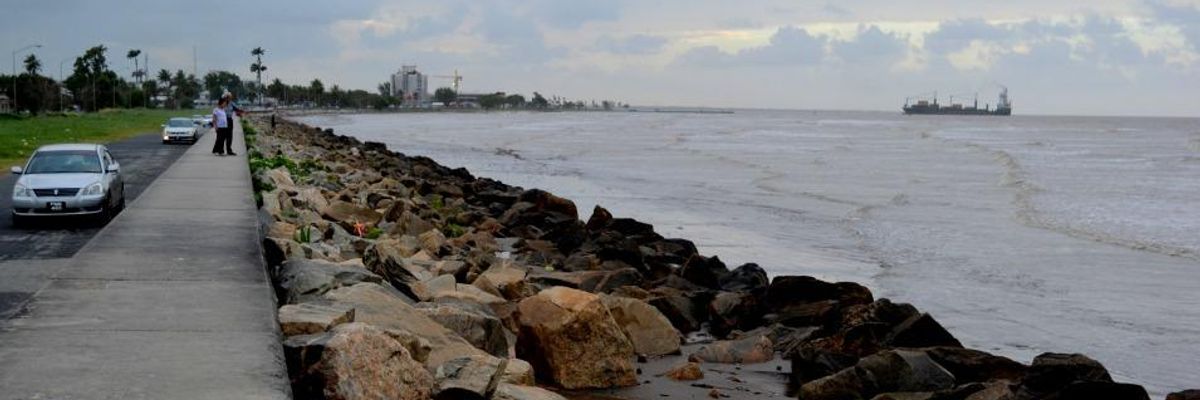International human rights and anti-corruption group Global Witness is calling on the Guyanese government to renegotiate a oil license deal with fossil fuel giant Exxon after the group's analysis showed that Guyana stands to lose $55 billion while the oil giant takes control of one of the largest oil reserves found in years.
Global Witness found that the rushed deal left Guyana with a lower profit share from Exxon's Stabroek oil license than countries generally get from such negotiations. The group based its findings on a study by financial analysis firm OpenOil comparing Guyana's contract with Exxon to deals between governments and oil companies around the world.
Under the deal, Guyana could lose up to $1.3 billion per year--money which could be used for schools, hospitals, infrastructure, and to repair crumbling sea walls in a country where "90% of the population [is] at risk from rising sea level," Global Witness said in its report, entitled "Signed Away."
Global Witness interviewed Guyanese citizens last summer about the country's high unemployment rate, sugar farms which have been forced to close, and the revenues needed to protect the country from sea level rise--a phenomenon largely driven by the climate crisis and extractive activities like oil drilling.
"In Mahaicony, Guyana's breadbasket on the coast, we were shown wide swathes of farm fields flooded with salt water," the report reads. "The sea wall had collapsed, crops were ruined, livestock was getting sick, and it would be years before the land recovered. Money was desperately needed to rebuild coastal defenses."
Patrick Galey, environment correspondent for Agence France Presse, tweeted that Guyana's resources have been "plundered by oil barons."
"Guyana's loss. Humanity's loss," Galey wrote.
Global Witness blamed Exxon's "exploitative" deal-making process for the unfair agreement. The company had a license for the Stabroek oil reserve off the Guyanese coast in 1999, and rushed to renew the license quickly after finding oil there in 2016.
"Guyana's urgent development needs--such as building new hospitals and schools, and protecting itself from rising sea levels that put 90% of the population at risk--will not be met by Exxon walking away with an extra $55 billion in its back pocket."
--Jonathan Gant, Global WitnessThe group says Exxon violated its own policies when it paid for Guyanese Natural Resources Minister Raphael Trotman to take a lavish trip to the company's Texas headquarters, complete with a first-class flight, a stay at an expensive hotel, and a meal at an exclusive restaurant. Exxon's internal policy prohibits gifts that may "improperly influence pending business decisions."
"It is shocking that Exxon would seek such an exploitative deal in one of the Western Hemisphere's poorest countries," said Jonathan Gant, senior campaigner at Global Witness. "Guyana's urgent development needs--such as building new hospitals and schools, and protecting itself from rising sea levels that put 90% of the population at risk--will not be met by Exxon walking away with an extra $55 billion in its back pocket."
Global Witness also believes Trotman may have had a conflict of interest during the deal because his political ally, Nigel Hughes, was a lawyer for Exxon. His firm has represented the company since 2009, but Hughes denies he worked on the Stabroek oil reserve deal.
Still, the group called on Guyanese officials "to investigate the Exxon deal and the ministers involved, and to demand a new, fair license."
Global Witness also said U.S. authorities, including the State Department, should support renegotiation.
Renegotiating the contract could boost the country's budget, the report reads.
"With an average extra $1.3 billion per year from Stabroek, Guyana could address the concerns of its people," said Global Witness. "The government's total 2019 annual budget is $1.4 billion. With additional money from Stabroek, Guyana could double its annual $172 million health budget, $251 million education budget, $185 million infrastructure budget and still have $700 million left each year."
The report also details two oil license deals--called Kaieteur and Canje--which were originally awarded to two smaller companies which then gave drilling rights to Exxon before extracting oil.
"Exxon's Kaieteur and Canje licenses raise corruption red flags and should be investigated," said Gant. "Given these problems and the threats to Guyana posed by the global climate emergency, Guyana should renegotiate the Stabroek license and then ban all new drilling in the country."
